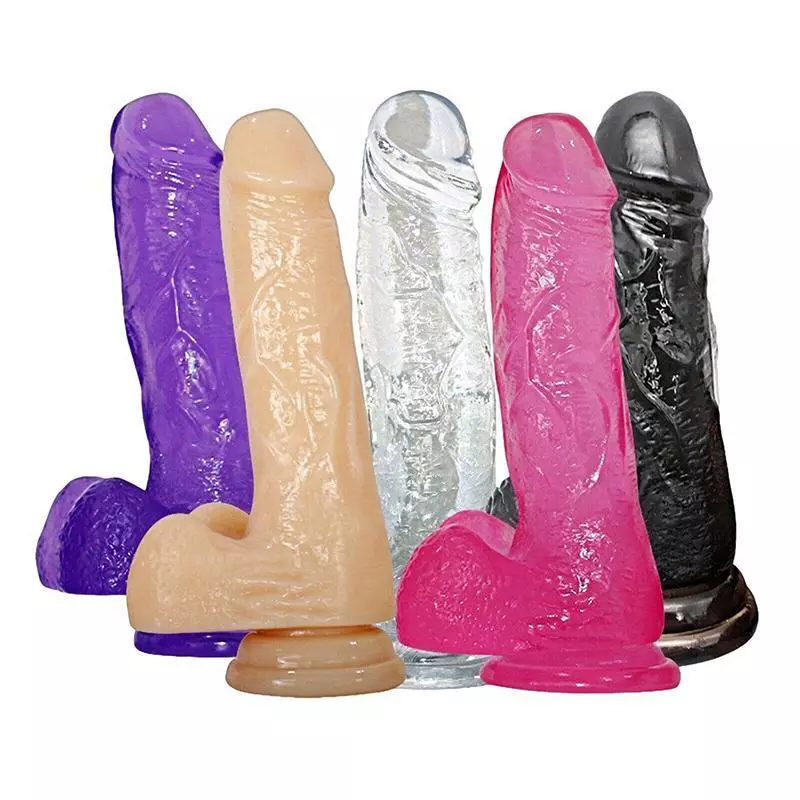Sex Toy Materials-Snake Oils in Sexy Packaging?

In your search for the perfect sex toy, you may have come across warnings about elusive sex toy materials, in particular phthalates. In 2006, Greenpeace Netherlands and UK started a huge debate and phthalate scare among consumers, retailers and manufacturers of sex toy products by calling on the European Union to ban all phthalates in sex toys. Phthalates are a chemical compound often called “plasticizers” that are used as softening agents for hard plastics, including sex toys or “adult novelties”.
Phthalates are normally used in jelly or latex sex toys and may be labeled “rubber jelly”, “latex rubber”, or “crystal-something”. They can be identified by their chemical odor, soft pliable nature, and sometimes gooey, gasing-off or oozing of a slick oil-like substance. This is not lubricant. Many manufacturers will scent their jelly products to hide the unpleasant chemical odor these toys often have.
Phthalates are classified as “probable human carcinogens” and have been banned by Health Canada for use in children’s and pet’s toys, but regrettably not sex toys. In one study it was found that they, “can cause liver, kidney and testicular damage” in lab rats.
Hans Ulrich Krieg, a German researcher found that no-less-than 10 dangerous chemicals “gassed-out” of sex toys. Although there hasn’t been any comprehensive human testing, researchers suspect that these chemicals can “leech-off” into the body, causing body burdens that can lead to cancer as well as damage the reproductive system and potentially cause sexual developmental abnormalities. To date there is no conclusive information about what effects phthalates may have on our bodies, but it is better to be safe than sorry. Most retailers will strongly recommend the use of condoms with any of these type products to reduce your contact with its ingredients.
Some companies, such as Doc Johnson, are now removing the use of phthates from their sex toy materials, using labels like “phthalate-free”. Other companies have never used phthalates such as Tantus, Fun Factory, and Vibratex, using medical-grade silicone instead. Cyberskin by Topco is also phthalate free and approved by the FDA.
Your safest bet is to buy non-porous, non-toxic toys like glass, acrylic, surgical steel, hard plastic, or silicone. Silicone is non-toxic, non-porous, flexible, hypoallergenic and hygienic. Although silicone toys are more expensive than lesser quality jellies, they are much more durable giving you more bang for your buck, are hand-cast and not mass-produced, and you don’t have to worry about potential health risks while enjoying them. Be careful, however, as manufacturers may legally say a sex toy is made of silicone if it contains only 10% silicone, and labeling of materials and packaging is tricky. It is often difficult, if not impossible to find out what is in a material as many low-quality manufacturers don’t list ingredients, or even offer it to the toy sellers. Some cheaper manufacturers realized that by saying their product “contained” silicone, they could effectively confuse consumers and increase their sales. Silicone always has a matte texture unlike clear jellies, and is odorless and tasteless.
Vinyl is a porous material that has a more solid feeling than jelly rubbers. They may also contain phthalates however or other harmful chemicals.
VixSkin Silicone is a new, innovative product by manufacturer Vixen Creations. VixSkin is 100% silicone, yet has the realistic look and feel of cyberskin. VixSkin toys also have a lifetime warranty.
TPE or Thermoplastic Elastomere, created by FunFactory, is a patented hypoallergenic gelatinous (clear) material that is not silicone, yet is as soft as jelly and a safer alternative. Elastomer is phthalate and latex free. Like silicone it is tasteless and odorless. Unlike silicone it is porous and cannot be disinfected, so should be used with a condom.
CyberskinTM (or softskin) toys are a type of thermal (heat conducing) plastic that boast being “the closest thing to skin-to-skin sensation you’ll find in a sex toy”. Although this is true, they are porous and tend to be as pricey as silicone.
Other realistic toys such as Futurotic, UR3 (Ultra-Realistic), NeoSkin, Fauxskin, Soft Touch, or UltraSkin, may not boast the same claims.
TPR Plastic (Thermoplastic Rubber) is a relatively new compound that is phthalate-free. Like silicone and other hard sex toys it is non-porous, yet light-weight, very soft, flexible and very strong. Emotional Bliss is a UK manufacturer that uses TPR Plastic to makes “intimate massagers” that are very popular in Europe.
Plastic, acrylic and lucite toys do not contain phthalates, are hard, smooth in texture and non-porous. They can be cleaned with antibacterial soap and water. Plastic is ideal for transmitting vibrations, which makes them more intense. Acrylic and Lucite are a clear type of plastic. Both types look like glass, are often visually artistic, durable, easy to clean, and hard to damage. They often last a lifetime and are usually more expensive.
Glass is non-porous, very smooth and cool until it heats up, after which it retains its heat quite well. Pyrex ® glass (the company that makes glass bake ware), is extremely strong, scratch and chip-resistant and according to the manufacturer completely safe for intimate use. You can sterilize glass by boiling or warm it up in a microwave. I have also heard to placing glass dildos in the freezer to a short time to turn into a sensation play popsicle. Glass dildos can be clear or dichroic (having more than one color, especially when viewed from different angles). Glass does not contain phthalates.
Metal sex toys have all the same qualities as glass (conducts heat & cold, can be sterilized, hard). One example is Betty Dodson’s Vaginal Barbell used for kegel exercises.
Greenpeace proposes a law which ensures that only safe substances be put on the market, and that companies make public their chemical ingredients on all products. Until this law gets passed, it is the responsibility of consumers to beware of false claims and poor products. All sex toys are labeled “novelty items”, which means they have not been FDA approved by government agencies for sexual purposes (even though we all know that people don’t buy them to put on their mantel pieces.) This allows inferior products such as jellies to remain unregulated, and the manufacturer free from responsibility because they claim they were never intended for internal use. So it is important to learn more about manufacturers and their policies. Some of the manufacturers I recommend include Emotional Bliss, Vibratex, Tantus, Doc Johnson, Vixen Creations, FunFactory, Phallix, and Natural Contours products.
Read more about these issues at Greenpeace, Chemical Body Burden, Phthalates and Human Health, and CBC’s “Bad vibrations: A look at sex toys in the Market place“.










What an excellent and informative post. Thank you for your research. I’m sure I’ll refer to this information repeatedly.
.-= Raven Quince´s last blog ..Dangerous Lilly’s Contest: Win an Njoy Pure Wand! =-.
Hey Raven! Thanks for visiting. Glad you liked the article…
Don’t miss my new contest 🙂
http://popmycherryreview.com/articles/g-twist-contest-review/
@dominadoll Thank you for the link!!! 😀
NobEssence. Beautiful wood toys with a hypoallegenic food grade, non porous sealant. Pricey but artsy, ergonomic,and environmental! No affiliation. Just dying for one!
NobEssence review coming soon 🙂
Good to know this kind of stuff ,thanks for sharing ,just I am not sure how to really be aware of this chemical material. Sorry for my previous message.